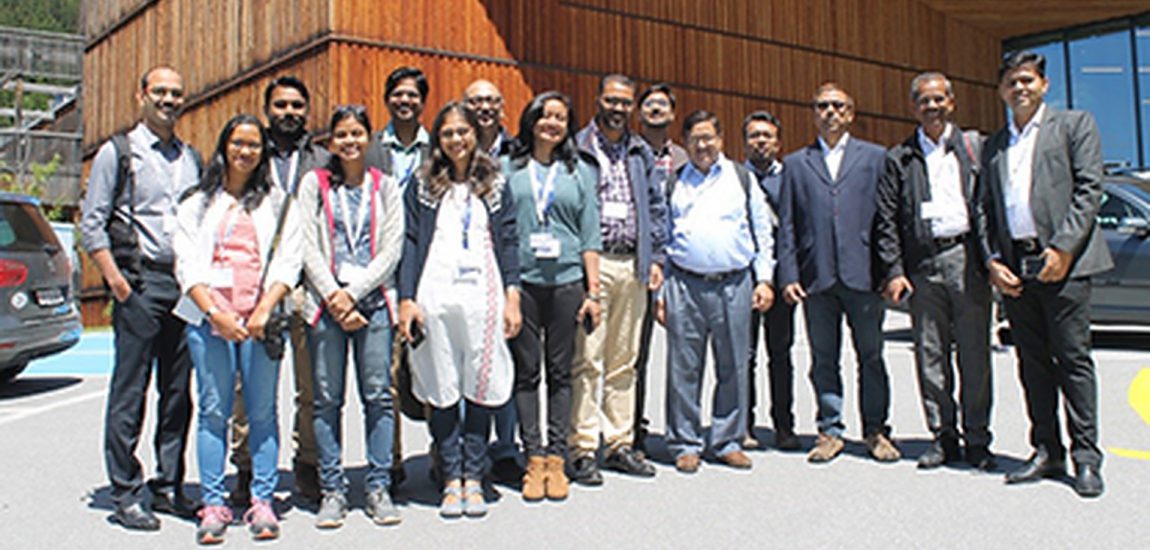
EAG sponsored students at POLAR2018: Where the Poles come together
POLAR2018, a joint event from the Scientific Committee on Antarctic Research (SCAR) and the International Arctic Science Committee (IASC), is a major event on the Polar Science calendar. In June this year, the event was attended by two EAG sponsored students, Shabnam Choudhary and Neelu Singh, who traveled all the way from India to Davos in Switzerland to present their research on an international stage. Being in the final stages of their PhDs, Shabnam and Neelu made the absolute most of their chance to participate in the various activities and events on offer for early career researchers and took full advantage of the opportunities to get involved and meet other polar scientists at this crucial time in their careers. Read on to find out more about some of the exciting things they got up to, including video-blogging and working as rapporteurs at the Arctic Observing Summit.
Presenting at the POLAR2018 Open Science Conference
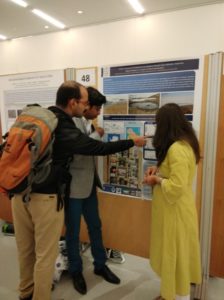
Shabnam: I was pleased and excited to get the opportunity to present my research in the form of a poster in the galaxy of stalwarts of Polar Science. I got to meet many different participants and experts from around the globe and it was really a wonderful experience interacting with scientists expert in limnology. In particular, I had some healthy and useful discussions with Prof. Dominic Hodgson (Senior Sediment Scientist, British Antarctic Survey and Visiting Professor at Durham University) and Stephen Roberts (British Antarctic Survey), whose work I have been following since I started working in the field of limnology. Both have worked on lakes from Larsemann Hills, Antarctica, and could judge my research work with their full proficiency. They gave me some good feedback and suggestions that would make my research work more meaningful.
Neelu: I presented my research findings in the form of poster to many polar scientists in the arena of the conference. I was especially pleased to get an opportunity to interact with Dr. Marco Grotti and Dr. Francisco Ardini from the University of Genoa in Italy, who are also working in the same region – Kongsfjorden, Ny-Ålesund. I received many constructive suggestions from the scientific community for continuing my studies as a postdoctoral researcher in order to understand the long-term effect of anthropogenic pollutants in the Arctic.
Meeting the Plenary
Neelu: A special “Meet the Plenary’ event was organized for early career researchers (ECRs) to provide them with the opportunity to meet a plenary speaker in person, ask them questions in a small-group setting and engage in discussions with them. At this event, I met Dr. Hajo Eicken from the International Arctic Research Center, University of Alaska (USA) and learned about the ‘The need for coordinated observations to inform responses to rapid Arctic change’.
Shabnam: The “Meet the Plenary” event gave me and other ECRs the chance to meet plenary speaker Elizabeth Thomas, a paleoclimatologist at the British Antarctic Survey. The event was a good opportunity for us to get introduced to the international scientific community and to learn about the scope of the field and new techniques in paleoclimatology.
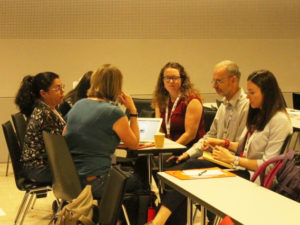
Volunteering as a video blogger
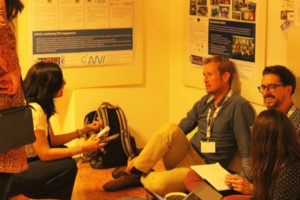
Neelu: Along with Shabnam and one other ECR, I was selected as a video blogger for the Open Science Conference at POLAR2018. Each day we captured the activities of the event and presented them to the audience the next day in the form of a 5-minute video before the start of the sessions. Different types of video were prepared based on different themes, such as a message for ECRs from senior scientists and what the POLAR2018 conference meant to ECRs. It was a great experience interacting with so many delegates, from ECRs to senior scientists, and hearing about the different ways that these types of conferences are important to them.
Shabnam: As a videoblogger, I got the opportunity to interact with the experts and ECRs who shared their experiences and gave feedback about the conference along with making new friends. Even stalwarts like SCAR secretary Chandrika Nath, International Arctic Science Committee Secretariat Allen Pope, and Executive Secretary of European Polar Board Renuka Badhe spoke about their experiences and encouraged young researchers to participate in such conferences which give them an excellent platform to learn and showcase their talents.
Watch the videos made by the videoblogging team via the links available here!
Working as a rapporteur
Shabnam: Both Neelu and I got the opportunity to work as rapporteurs at the Arctic Observing Summit (AOS), which took place in Davos from 24–26 June. Our responsibilities were to take detailed notes, which form the basis of reports, back to the plenary and to help in the writing of the final report for Arctic Science Ministerial. I was assigned as a rapporteur for Working Group WG-1: “The need for the observing system”. It was a valuable and interesting experience to be able to interact and communicate with policymakers and learn about their way of working.
Neelu: At the AOS, I acted as rapporteur for the Thematic Working Group 5, which focused on the uses of data and information derived from observing systems. I also worked as a rapporteur at the European Polar Board Meeting on the Friday before the Open Science Conference. As Shabnam said, working as a rapporteur provided great opportunities to be able to meet and network with policymakers and senior scientists.
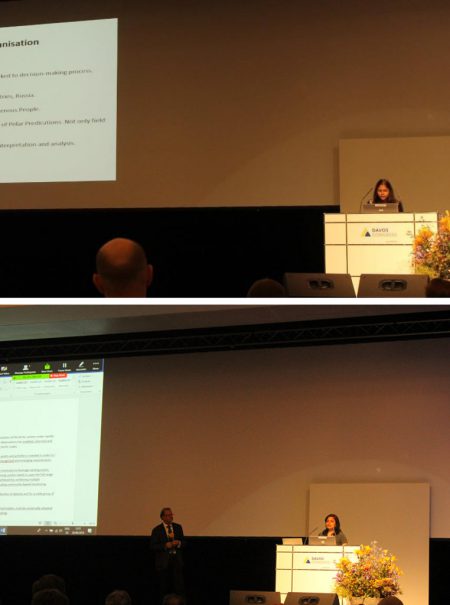
A take-home message for Early Career Researchers
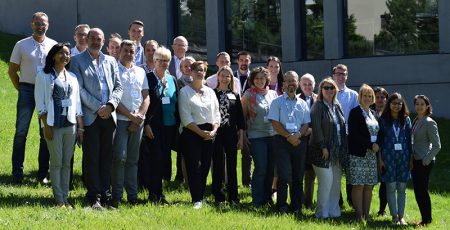
Shabnam: Being an ECR, I strongly recommend participating in events such as POLAR2018. It is incredibly helpful to be able to meet and discuss your research interests in a global context and these types of international conferences provide a perfect niche for this. POLAR2018 included an open workshop for all ECRs, guiding them on topics such as “how to choose a good mentor” and “how to find sources of funding” etc., and there were many other interesting workshops and events on the program aimed at introducing young scientists to new career opportunities related to research.
Neelu: It is very important to present your work at conferences like POLAR2018 before submitting your Ph.D. thesis. Attending conferences gives you a platform to get constructive suggestions from experienced researchers, to improve your communication skills and to form networks, and all ECRs should participate in international conferences where possible.
Final words and thanks
Neelu: It is very difficult to arrange travel funds to attend an international conference as an ECR and I would like to express my sincere gratitude to EAG for making it possible to attend the conference by providing travel support. The POLAR2018 conference provided me with some great experiences and so many opportunities to get involved!
Shabnam: The Open Science Conference at POLAR2018 provided me with a platform to learn more about the different aspects of paleolimnology, and it was a great opportunity to interact with experts in the field and present and discuss my Ph.D. research on the Arctic and Antarctic regions. I would like to state my gratitude to the various funding bodies (EAG and Goa University) for providing me with this opportunity, which allowed me to get exposed to and acquainted with new emerging trends in the field of Polar Science, and specifically in terms of limnology and geochemistry.
About the Authors
Neelu Singh: I am pursuing a PhD in Geochemistry from Mangalore University, India. During my time as a PhD student, I have worked extensively on the study of trace metals and persistent organic pollutants (POPs) in the Polar regions, an experience which has given me a command over many topics and global climate issues related to the environment. Instead of being locked behind a fence, my work has provided me with unequalled opportunities to participate in scientific expeditions and a platform from which to interact with students and scientists from various backgrounds and ethnicities. I have participated in several national expeditions carried out at “global hotspot” study locations, including Antarctica, the Arctic and the Indian Ocean sector of Southern Ocean.
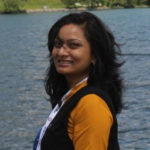
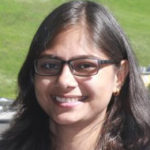
Shabnam Choudhary: I am a Ph.D. candidate in Antarctic and Arctic limnology at the Department of Marine Sciences, Goa University, Goa. Broadly, my research interests are in the domains of Paleoclimatology, Paleolimnology, and Palaeoproductivity through the Holocene using high-resolution studies to infer high latitude climate and its imprints on a global scale. My work focuses on generating high resolution paleoclimatic and palaeolimnology data specifically from East Antarctica and regions around Ny-Ålesund, Svalbard in order to understand climate variability throughout the Holocene and to understand the biogeochemistry of Antarctic and Arctic lakes. Through my research, I have participated in several national expeditions including the XXXIV Indian Scientific Expedition to Antarctica, 2015, and the Indian Arctic expedition-Summer phase, 2016.
